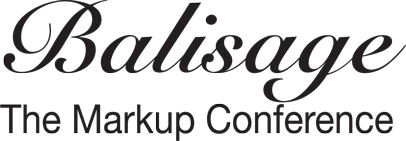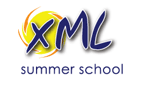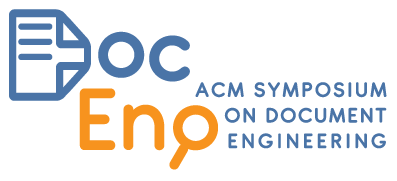Schedule for Saturday
chaired by yours truly Jirka Kosek (morning) and Mohamed Zergaoui (afternoon)
| 9:00 | Registration desk opens |
| 9:30 | Opening of the last conference day and sponsor presentations |
| 9:40 | Profile driven transformation service at the Dutch Central Bank Roland Hommes (Dutch Central Bank) and Geert Bormans (C-Moria BV) |
| 10:10 | The Next Millenium Document Format Svante Schubert |
| 10:40 | X-definition 3.3 – XML and JSON Václav Trojan (Syntea Software Group) |
| 11:00 | Coffee break |
| 11:30 | (Re)presentation in XForms Steven Pemberton (CWI) and Alain Couthures (AgenceXML) |
| 12:00 | Greenfox – a schema language for validating file systems Hans-Juergen Rennau (parsQube GmbH) |
| 12:30 | Shooting XQuery arrows fast and accurately Juri Leino (exist solutions) |
| 13:00 | Lunch |
| 14:30 | XProc 3.0: Ready or Not Norman Tovey-Walsh (MarkLogic Corporation) |
| 15:00 | Use cases and examination of XML technologies to process MS Word documents in a corporate environment Colin Mackenzie (Mackenzie Solutions Ltd) |
| 15:30 | XML-MutaTe: A declarative approach to XML Mutation and Test Management Renzo Kottmann and Fabian Büttner (Coordination Office for IT Standards /KoSIT/) |
| 16:00 | Coffee Break |
| 16:30 | An Analytical Approach to Writing XSLT Transformations for Converting Documents Between DTD Versions Liam Quin (Delighful Computing) |
| 17:00 | XSLT Earley: First Steps to a Declarative Parser Generator Tomos Hillman (eXpertML Ltd) |
| 17:30 | Closing of the conference |
Session details
Profile driven transformation service at the Dutch Central Bank
Roland Hommes (Dutch Central Bank) and Geert Bormans (C-Moria BV)
This presentation reports on a successful implementation of an XSLT based transformation solution that handles 5 structured syntax formats (XML, XBRL, SDMX, JSON, CSV) across approximately 400 different reports going in and out of the Dutch Central Bank.
» slides
The Next Millenium Document Format
Svante Schubert
Most of today’s leading document formats have their roots in the eighties. Their design was built upon requirements of these days: to represent the document state on one single machine or to exchange a document by floppy disc or modem. Often designed for a single purpose far narrower than their current usage. New features were often accomplished by workarounds. For example, change-tracking of any office format does not track a defined interoperable change. Only the earlier state of the changed area is stored, to be swapped back in case of rejection. Nowadays, with the rise of mobile devices, online collaboration is ubiquitous and creates challenges when dealing with documents designed for an environment from the eighties. In this paper, we lay out a concept how to evolve a new document format that allows not only collaboration, but responsiveness and interoperability by design.
» slides
X-definition 3.3 – XML and JSON
Václav Trojan (Syntea Software Group)
New version of X-definitions 3.3 allows to work with data both in XML and JSON form. The input data is validated according to the rules described in the X-definition. Input and output after processing can be both XML document and JSON object.
» slides
(Re)presentation in XForms
Steven Pemberton (CWI) and Alain Couthures (AgenceXML)
This presentation discusses how XForms content presentation works, and the requirements for controls, discusses how one implementation, XSLTForms implements content presentation and the use of CSS styling to meet the requirements of controls, and future improvements in both.
» Read paper in proceedings
» slides
Greenfox – a schema language for validating file systems
Hans-Juergen Rennau (parsQube GmbH)
Greenfox is a schema language for validating file systems. One key feature is an abstract validation model inspired by the SHACL language. Another key feature is a view of the file system which is based on the XDM data model and thus supports a set of powerful expression languages (XPath, foxpath, XQuery). Using their expressions as basic building blocks, the schema language unifies navigation within and between resources and access to the structured contents of files with different mediatypes.
» Read paper in proceedings
» slides
Shooting XQuery arrows fast and accurately
Juri Leino (exist solutions)
In my research in how to write readable and maintainable XQuery code, I stumbled upon the arrow operator introduced in XQuery 3.1. It has the potential to get rid of a lot of parentheses, indentation and helps with nested function calls. I started writing a library to make working with it more comfortable and will present what I learned along the way.
» slides
XProc 3.0: Ready or Not
Norman Tovey-Walsh (MarkLogic Corporation)
For the past several years, the XProc Community Group has been steadily progressing towards a finished, published set of specifications for XProc 3.0. In the life of any working group, there comes a time when focus must shift from new work to finishing the proposed deliverables. We fully anticipate declaring the specifications for XProc 3.0 to be “finished” before XML Prague 2020.
» slides
Use cases and examination of XML technologies to process MS Word documents in a corporate environment
Colin Mackenzie (Mackenzie Solutions Ltd)
This presentation will investigate some of the use-cases for processing Word documents found in the corporate environment (focusing on improving quality) and will demonstrate using an example toolset developed in XProc and XSLT3 that the use of open standard XML technologies can provide significant advantages.
» Read paper in proceedings
» slides
XML-MutaTe: A declarative approach to XML Mutation and Test Management
Renzo Kottmann and Fabian Büttner (Coordination Office for IT Standards /KoSIT/)
Important in XML based data standardisation is correctness of XML language designs. A general approach to testing of XML Schema and Schematron designs is to write own test frameworks including a set of XML instances to validate against the XML schema languages during development. We present a new integrated test approach. It combines three concepts with a simple declarative language for annotating XML test instances. The first concept of mutation for automatically generating many new test instances from a single original instance. The concept of validation with expectation compares a positive or negative validation result with an expectation of a test writer. The last concept adds test metadata XML test instances without interfering with XML schema language design and XML parsing. We also present xml-mutate as a prototype implementation that supports generation, execution and reporting of positive and negative test cases.
» Read paper in proceedings
» slides
An Analytical Approach to Writing XSLT Transformations for Converting Documents Between DTD Versions
Liam Quin (Delighful Computing)
People working with large XML vocabularies occasionally face the task of upgrading to a new version of a vocabulary. A similar situation arises when documents must be exchanged with an organization using a different version of a vocabulary. This paper describes an effective computer-aided approach to writing transformations in XSLT to convert documents to conform to a slightly different version of a DTD; similar techniques apply for arbitrary schema languages with caveats noted in the text. A tool to assist in this process is also described.
» Read paper in proceedings
» slides
XSLT Earley: First Steps to a Declarative Parser Generator
Tomos Hillman (eXpertML Ltd)
This paper aims to lay the ground-work for producing a parser generator that creates XSLT parsers for given grammars. Examples from previous papers on the topic will be used to manually create both an XML representation of the grammar, and the desired tree structure of Earley items. In turn, these should inform what an XSLT parser for that grammar should look like. Finally the paper will discuss how the resulting parser can be abstracted and extended so as to parse using an arbitrary grammar, to use other grammar languages, and to create an XSLT parser-generator.
» Read paper in proceedings












